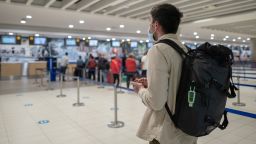Seasonal flu activity remains high in the United States, but continues to slow in most parts of the country, according to data published Friday by the US Centers for Disease Control and Prevention.
Hospital admissions for flu decreased for the second week in a row last week. There were about 21,000 new hospitalizations for the week ending December 17. That’s down from a season high of more than 26,000 new admissions two weeks earlier, which was the week following Thanksgiving.
Despite these improvements, it’s not clear that the virus has peaked. Respiratory virus activity remains “high” or “very high” in nearly every state, and experts warn that things may tick up again as holiday travel and gatherings continue.
The CDC estimates that there have been at least 18 million illnesses, 190,000 hospitalizations and 12,000 deaths from flu so far this season.
The cumulative hospitalization rate is more than six times higher than it has been at this point in the season in more than a decade.
And flu is far from the only virus in circulation; a stew of other respiratory viruses has been spreading for weeks, driving an unusually high number of hospitalizations.
As of Friday, hospital capacity remains near record levels with about 77% of beds in use nationwide.
RSV has peaked in the US as test positivity rates and new hospitalization rates have slowed over the past month, and weekly RSV hospitalizations have dropped dramatically over the past month. But hospitalizations are still slightly higher than normal.
Covid-19 levels remain far below prior surges, but trends are definitely on the rise across the United States: New hospital admissions have jumped nearly 50% over the past month.
Dr. Sean O’Leary, chair of the American Academy of Pediatrics’ Committee on Infectious Diseases and professor of pediatric infectious disease at the University of Colorado School of Medicine and Children’s Hospital Colorado, told CNN it’s hard to predict what will happen since RSV and flu season both took off early – and they may already have peaked.
The holiday can still drive an increase in illnesses.
Get CNN Health's weekly newsletter
Sign up here to get The Results Are In with Dr. Sanjay Gupta every Tuesday from the CNN Health team.
“Holidays do lead to sometimes a small, sometimes a modest spike in infections, with people gathering together indoors,” O’Leary said.
US health officials have been urging people to get vaccinated against the flu and Covid-19, wear masks in higher risk situations and focus on hand washing.
White House Covid-19 response coordinator Dr. Ashish Jha has urged people to stick to one rule of thumb, in particular: “If you are feeling sick, you should stay home.”
CNN’s Carma Hassan contributed to this report.


